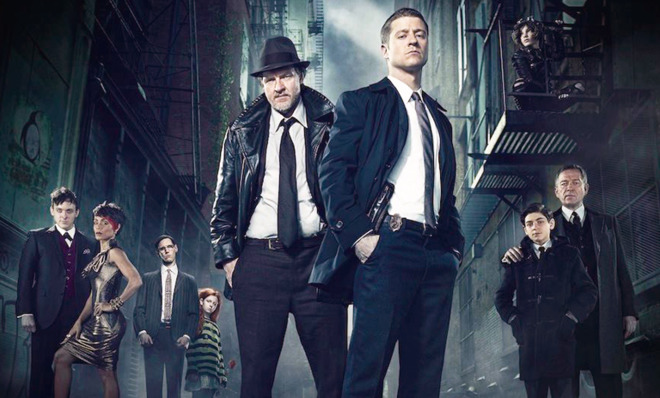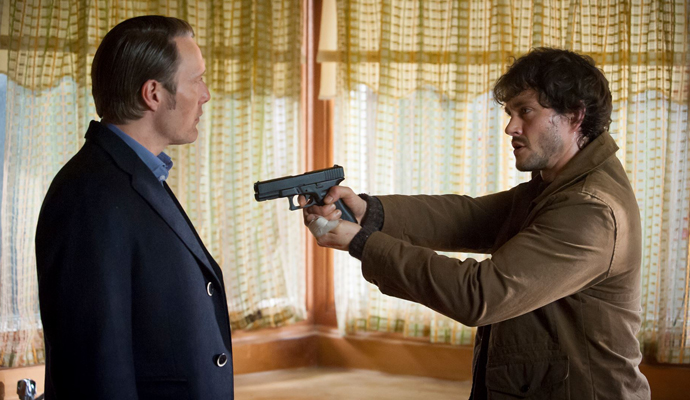How internet fandom is changing television, one Gotham at a time
The passion among even small groups of fans burns brighter than ever. And the TV industry would be foolish not to capitalize on it.

A free daily email with the biggest news stories of the day – and the best features from TheWeek.com
You are now subscribed
Your newsletter sign-up was successful

Fox recently premiered the trailer for its highly anticipated Batman origin story, Gotham. Already greenlit for 13 episodes, Gotham centers on a young Jim Gordon and his relationship with recently orphaned child-billionaire Bruce Wayne.
As you might expect, the internet had a lot of feelings about it, as the internet usually does when it comes to superheroes. Most of the reaction has been fairly excited, mixed with a heavy dose speculation and a little bit of skepticism.
But whether Gotham will actually be good or not isn't even necessarily the most interesting thing about the series. Gotham is the latest in a string of shows that are expanding on a well-known universe by taking it to television. And by bringing these beloved properties to TV, Hollywood is changing the relationship we have to our favorite stories like never before.
The Week
Escape your echo chamber. Get the facts behind the news, plus analysis from multiple perspectives.

Sign up for The Week's Free Newsletters
From our morning news briefing to a weekly Good News Newsletter, get the best of The Week delivered directly to your inbox.
From our morning news briefing to a weekly Good News Newsletter, get the best of The Week delivered directly to your inbox.
The most obvious comparison to Gotham in this regard is Marvel's Agents of S.H.I.E.L.D., the ABC show from genre-wizard Joss Whedon. Although it hasn't proven to be the ratings juggernaut Disney had hoped for, fans of the show have insisted it keeps getting better and better.
But even without massive ratings, Agents of S.H.I.E.L.D. is impressive simply for taking the superheroes out of the equation and still getting people to watch. Agents of S.H.I.E.L.D. shows that while the general public won't show up for anything under the Marvel brand, you can create a successful series with the support of a few loyal followers.

Casual fans of the Marvel films, which is to say most people, might not be ready for a show exploring the complexities of the universe, but Agents of S.H.I.E.L.D. proves die-hard fans are. Gotham should be so lucky to have all die-hard Batman fans show up.
But what's even more fascinating than the expansion of comic book universes on television is the recent trend in expanding the universes established in popular films.
A free daily email with the biggest news stories of the day – and the best features from TheWeek.com
Superhero stories almost always have a dense mythology, ripe for hours of television. But in the past, film to TV adaptations have almost always been either a retelling of the original story or a continuation of it. And either way, they were generally considered to be a dubious proposition at best.
You can look at My Big Fat Greek Life, which falls into the continuation category, as proof. Yet occasionally, something like M*A*S*H would come along, a show which falls into the retelling category, even though much of its success is certainly due to putting its own spin on the original film version.
However, shows like Hannibal, Bates Motel, and Fargo are doing something much different than the usual movie to TV adaptations. Each is expanding on the world of the film they're based on by creating their own versions of the story, then changing and honoring those stories as they see fit.
Noel Murray, Matt Singer, and Scott Tobias at The Dissolve recently discussed this phenomenon. Murray asserted that Bates Motel was interesting because of "how little it has to do with Psycho, beyond the location and the character names," but went on to note that, "On the other hand, the Friday Night Lights TV series borrowed a lot of the style of the film; and while Hannibal has a style all its own, the emphasis on the twisted, symbiotic relationship between Will Graham and the serial killers he chases is very much in the spirit of Manhunter, et al."
Friday Night Lights is perhaps the most interesting example of a TV show that expanded on a film (which started out as a book), since it has none of the traditional genre elements of the other aforementioned shows.

It probably wouldn't be too big a stretch to trace the likes of Hannibal and the others all the way back to Buffy the Vampire Slayer (another Whedon creation) in terms of redefining original source material. But the fact that even a show like Bad Teacher appears to be building upon the film its based on shows just how drastically the process of adapting a movie for television has changed in the past few years.
It makes sense that these universes are being expanded upon now in the age of internet fan fiction. The passion amongst even small groups of fans burns brighter than ever, thanks to the communities they have online. And the television industry would be foolish not only to try and capitalize on that, but to foster it, thereby creating the loyalist possible audiences.
All that said, expanded universes can be tricky. It was recently announced that the new Star Wars film would discard the expanded universe, a move which didn't go over well with some fans. However, others believe that the Star Wars expanded universe did more hard to the franchise than good. There is something to be said for simplicity, after all.
Gotham could have a problem on its hands if Batman fans decide they don't like seeing the caped crusader as a little kid anymore than Star Wars fans liked seeing Darth Vader as a little kid.
But if Batman fans are willing to accept certain changes, and let Gotham be its own story, then the show could easily thrive among the other expanded universes that are cropping up all over television. Because in today's media-saturated world, if you love something, you want to love it in as many ways as possible.
From our friends at The Daily Dot, by Chris Osterndorf.
More from The Daily Dot...
-
 What to know before filing your own taxes for the first time
What to know before filing your own taxes for the first timethe explainer Tackle this financial milestone with confidence
-
 The biggest box office flops of the 21st century
The biggest box office flops of the 21st centuryin depth Unnecessary remakes and turgid, expensive CGI-fests highlight this list of these most notorious box-office losers
-
 What are the best investments for beginners?
What are the best investments for beginners?The Explainer Stocks and ETFs and bonds, oh my